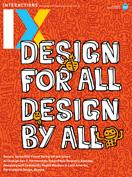Authors:
Elizabeth F. Churchill, Mikael Wiberg
Welcome to the September–October 2024 issue of Interactions.
As signaled by our cover art, Design for All, Design by All, and the titles featured on our cover, in this issue we have several submissions that address the issue of inclusion and inclusive design practices in critical areas. With so much change in the world and concerns around growing inequities, we feel that the issues tackled in these articles are increasingly relevant.
Our lead feature, "Making Voting Easier for Disabled and Overseas Voters: Secure, Accessible Virtual Voting Infrastructure," by Ted Selker and Justin Pelletier, addresses the importance of inclusive design to ensure a more democratic technological landscape focused on the democratic process itself: voting in an election. The authors describe a research, design, and development project in which they address the issue of people who are unable to vote despite being eligible. Their project offers four main goals for a more available, accessible, and secure voting process: providing evidence of a vote being cast and recorded; offering stability and predictability, with resilience to technology changes; embracing flexibility by allowing voting from a broad spectrum of personal devices and putting in place effective accommodations where needed; and offering interactivity and tracing/tracking reviews.
It is, as the authors point out, somewhat shocking that these are not must-haves for any voting technology in any context. Voting is at the center of democratic societies, so this is clearly a rich area for continued work around all levels of inclusive design.
Nora McDonald and her coauthors offer a perspective on including new voices in the design of AI in their article "AI Through Gen Z: Partnerships Toward New Research Agendas." With rich reportage of a panel conversation at CSCW 2023, the authors provide some critical insights. They point out that, unlike previous generations, Gen Z has grown up with content that incorporates AI technologies. Young people recognize that the ongoing development of AI will drive societal change, and they want to contribute to the development of solutions to address these challenges.
In "I Am Disabled but Not 'Impaired,'" Ather Sharif focuses on the changing and often cyclical nature of words. He reminds us of the weight words carry for individuals and how they drive social groups, institutions, and cultures to project, contain, enforce, and reinforce negative and exclusionary "othering" (e)valuations and behaviors. Sharif aptly states that words like impaired can result in disabled people internalizing their self-worth as being broken. We as researchers, scholars, and practitioners are invited to "employ practices and processes that allow for rethinking and challenging the terms [we] use to refer to vulnerable and disenfranchised populations."
In a new series, The IX Questionnaire, we will be featuring insights from ACM volunteers who are leading efforts in our community, SIGCHI, and in adjacent ACM Special Interest Groups (SIGs). In the first interview, Naomi Yamashita and Vanessa Evers, general chairs of CHI 2025, offer very human, playful insights into their HCI career journeys and discuss their hopes for the upcoming CHI conference, to be held in Yokohama, Japan, in April 2025. Also, please note that the CHI 2025 submission deadlines for some categories are coming up.
Finally, in Exit, Scott Minneman and Renato Verdugo share the remarkable work of Italian artist Giuseppe Penone. In the featured artwork, Alberi (Trees), Penone carved mature trees and large heartwood timbers to reveal and showcase them as saplings. To ensure inclusion both now and in the future, we need to also consider incorporating past growth and experiences into our work.
There is much more content in the issue than we have talked about here. We invite you to take a look and send us feedback to share with the authors. What resonates? What would you like to see more of? What would you like to contribute? And on that note, as always, we invite you to submit to Interactions in any of our open categories, and/or encourage colleagues and friends in the HCI, UX, IX, and related communities to do so. We have recently updated our submission guidelines, which can be found on our website at https://interactions.acm.org/submissions. We look forward to working with you soon.
Elizabeth F. Churchill and Mikael Wiberg
[email protected]
Copyright held by authors
The Digital Library is published by the Association for Computing Machinery. Copyright © 2024 ACM, Inc.








Post Comment
No Comments Found